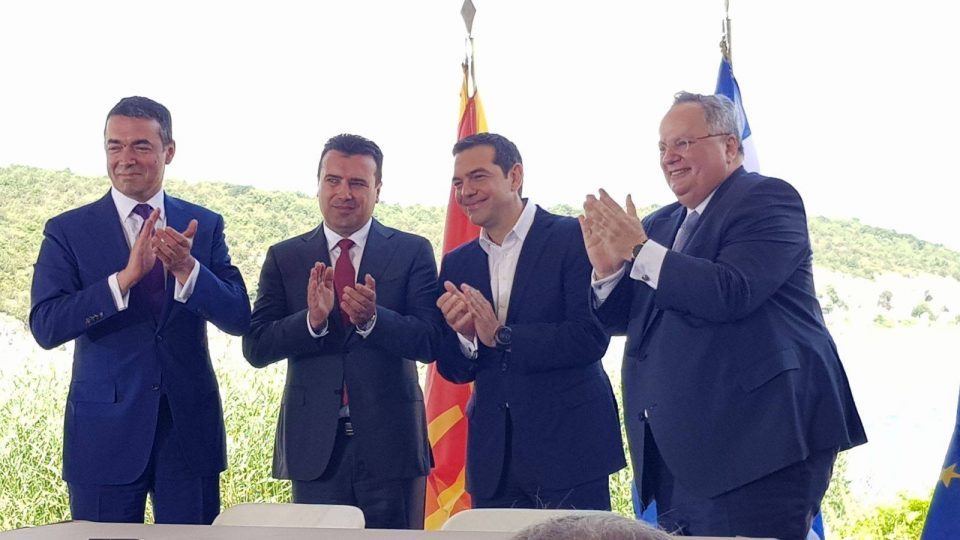Arguably, the Prespa settlement is the west’s biggest diplomatic achievement in the Balkans since the US-brokered Dayton agreements that ended the Bosnian war in 1995. Prespa raises hopes of progress in tackling other regional challenges, notably the Serbia-Kosovo dispute, ethnic rivalries and constitutional deadlock in Bosnia-Herzegovina, and strained Greek-Albanian relations. Here some caution is in order. The thorns of every Balkan problem are sharp and distinctive in their own way, reads a Financial Times analysis titled ‘Renaming of North Macedonia a rare Balkan diplomatic success’.
History should be a school, not a prison, says Nikos Kotzias, a former Greek foreign minister. For the Balkans, torn by ethnic, political, religious and territorial disputes that stretch back generations, this is an ambitious proposition. Yet the settlement of the name dispute between Greece and North Macedonia suggests Kotzias is on to something. Why should painful historical memories trap Balkan governments and societies in a never-ending cycle of suspicion and fear?
The Prespa agreement, named after a lake that straddles the borders of Albania, Greece and North Macedonia, took effect on February 12. The Former Yugoslav Republic of Macedonia renamed itself North Macedonia, a term that implies no territorial claim on the northern Greek region of Macedonia. For its part, Greece recognised the right of North Macedonia’s Slav majority to use the term “Macedonian” for their language and nationality. In this way an answer was found to the latest incarnation of the Macedonian question — a recurring source of tension in the southern Balkans since the late 19th century.
Arguably, the Prespa settlement is the west’s biggest diplomatic achievement in the Balkans since the US-brokered Dayton agreements that ended the Bosnian war in 1995. Our era is defined by tensions between the US and its European allies, by concerns over liberal democracy, the rule of law and political stability in central and eastern Europe, as well as competition in the Balkans, eastern Mediterranean and Black Sea among western powers, China, Russia and Turkey.
Prespa raises hopes of progress in tackling other regional challenges, notably the Serbia-Kosovo dispute, ethnic rivalries and constitutional deadlock in Bosnia-Herzegovina, and strained Greek-Albanian relations. Here some caution is in order. The thorns of every Balkan problem are sharp and distinctive in their own way.
The Greek-North Macedonian settlement, laudable though it is, cannot be a template for healing other conflicts. The dispute was born out of the collapse in 1991 of communist Yugoslavia. However, unlike in Bosnia and Kosovo, the quarrel did not unleash a war. It lacked the intercommunal tensions in towns and villages that were so crucial an ingredient of the Bosnia and Kosovo conflicts.
The name dispute raised serious questions about overlapping claims to the symbols and substance of national identity, reflected through prisms of historical myth, culture and present-day political struggle. But fundamentally it was a diplomatic problem that begged for a diplomatic solution.
Furthermore, the Prespa accord will be judged by whether it lays to rest doubts about the long-term stability of the North Macedonian state. For this to happen, three steps are necessary.
First, the EU must open its doors to North Macedonia and Albania. Ideally, the EU would launch accession talks this year with both states. EU membership would build on Prespa by rendering irrelevant the frontier between Greece and North Macedonia, just as it long ago banished the spectre of border disputes between France and Germany. Meanwhile, the start of EU entry talks with Albania ought to curb the temptation of nationalists in Tirana and Kosovo — a state with an ethnic Albanian majority — to exploit grievances among North Macedonia’s ethnic Albanians.
Second, Greek and Slav Macedonian opponents of Prespa must not seek to discredit or destroy the agreement. New Democracy, Greece’s centre-right opposition, appears well placed to return to power after the next parliamentary elections, due by October.
With its substantial voter base in northern Greece, New Democracy has been critical of Prespa. It would be wiser for Kyriakos Mitsotakis, the party’s leader, to endorse the agreement and help integrate North Macedonia into the EU and Nato, policies that are surely in Greece’s national interest.
Equally, it is time for Zaev’s rightwing opponents to bid farewell to Slav Macedonian chauvinism. Their embrace of bombastic nationalism did great damage to the young state’s reputation under the 2006-16 rule of Nikola Gruevski. Now North Macedonia must cultivate an inclusive civic patriotism that protects and even enhances the rights of its ethnic Albanians, who account for at least 25 per cent of its population.
This leads to the third point. The emerging question of the southern Balkans is whether the region’s ethnic Albanians will be content to remain dispersed in three states — Albania, Kosovo and North Macedonia — or whether some or all will seek to unite themselves in a Greater Albania. Any such gambit carries a high risk of embroiling the region in violence. Ethnic Albanian politicians in the three communities should therefore exercise restraint.
In exchange, however, the EU and regional Balkan politicians, including in Skopje, must reassure all Albanians that their aspirations to prosperity, civil rights and European integration are receiving proper attention. On this, no less than on the Prespa accord, will depend North Macedonia’s wellbeing and even its survival.





Comments are closed for this post.